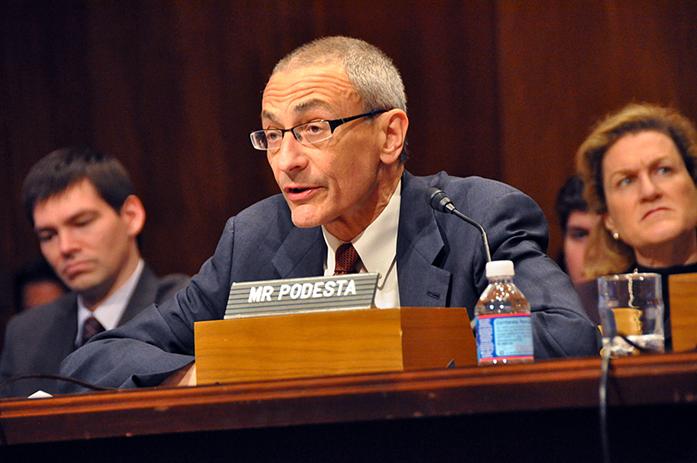In 1998, when the term Monica Lewinsky grew from a 22-year-old White House staffer who was allegedly sexually involved with a sitting American president to an international sex scandal, then-White House Chief of Staff John Podesta publicly turned to Michael “Mike” McCurry with one task in mind:
Answer media questions until the developing sex scandal blows over.
Podesta — a bold political tactician known inside the Beltway as a liberal policy wonk — was “demanding, compassionate, and forgiving,” recalled McCurry, a longtime Democratic strategist in an interview this week.
When the bright lifts that illuminate the White House press briefing room went dark after each work day in the months that enveloped the Democratic president, Podesta was the accountability czar that helped keep Clinton’s White House afloat, aides told The Daily Iowan in a series of interviews this week.
“If you came up short today, what are you going to do to come up on top tomorrow. That was his philosophy,” McCurry, Clinton’s then-press secretary said.
Podesta is once again in the political driving seat: he’s the national chairman for Hillary Clinton’s 2016 presidential campaign.
From his organizing suite inside Clinton’s Brooklyn, New York, office, Podesta is the former secretary of State’s middleman. Someone she can confidently confide in, all the way back since they first met in 1992.
And this week, fresh off what many political watchers saw as a winning speech for Clinton at the Iowa Democratic Party’s Jefferson-Jackson dinner, Podesta has hit the road again with one destination in mind: Iowa.
As he crisscrosses the state this week — visiting Cedar Rapids, Iowa City, Waterloo, and Des Moines grass-roots organizing offices by Tuesday evening — he’s bringing with him his treasure chest of political-operative skills.
While a high-profile D.C. activist, average Americans know little about the man fronting Clinton’s national campaign apparatus.
He hopes to change that.
On Tuesday, he said his first foray into presidential politics was during the 1968 Iowa caucuses.
“It all started here, when she jumped in that van,” Podesta told some 40 Iowa Democrats from inside the Iowa City organizing office, 361 E College St.
Podesta was referring to the Democratic candidate’s decision in mid-April to drive a 1,000-plus mile journey in a van affectionately named “Scooby” from her home in Chappaqua, New York, to her second presidential campaign’s first stop in Monticello.
At times noticeably brimming with excitement, Podesta has not wasted any of his 48-hour trip to Iowa in digging at Clinton’s Democratic rivals, most inherently, Sen. Bernie Sanders, I-Vt.
His first line of the afternoon at the Iowa City visit was to make sure that Democrats in attendance knew that Clinton stands in favor of firmer gun safety regulations, a topic Sanders has been criticized by some in the party for.
On numerous occasions, Podesta seemed to talk up more about the relevance of beating Sanders in his neighboring state of New Hampshire than Iowa.
“That’s going to be a dogfight right to the end,” he said of the fellow early voting state in response to a comment from an audience member about Clinton’s and Sanders’s decisions to often skip publicly naming one another in their attacks.
“We promise not to shout if he doesn’t shout,” Podesta said.
Unlike the 2008 presidential campaign that left Clinton crippled after losing on caucus night to then-Sen. Barack Obama, D-Ill., Clinton is better poised to maintain her lead in the state, former Democratic aides say.
“In 2008, when Mrs. Clinton ran, there was a committee-led effort to run her campaign,” said McCurry, who is now a Washington-based communications representative with the firm Public Strategies Washington Inc. “The problem was that too many people had too many good ideas on what to do.”
“[Podesta] is a central authority figure that wrestles issues to the ground,” he said. “She’s got a much better chance [now] given that there’s someone [Podesta] with real authority.”
It remains to be seen how Podesta will transition further from the Obama and Bill Clinton orbits, the former employers who helped him establish his political street cred.
Hillary Clinton has been careful not to bash Obama’s two-term presidency.
The same can’t be said for Podesta.
He occasionally ribbed Obama when he headed the Center for American Progress, a center-left think tank that fed policy ideas and personnel suggestion to the administration.
Clinton and Podesta haven’t always seen eye-to-eye on policy matters, either.
He came out against the controversial Keystone XL pipeline over a year before she announced her opposition.
Former White House and Democratic National Committee executives told the DI that Podesta’s Iowa swing is not simply to connect with Iowa voters but to correct.
“They know the horrendous story line they would face if Sanders pulls off a victory in Iowa,” said Terry Michael, a former DNC press secretary who worked alongside Podesta’s brother, Tony, as a part of Ted Kennedy’s 1980 presidential campaign. “It’s not uncommon at all to bring in your top gun.”
In an interview with the DI following his Iowa City appearance, Podesta declined to speak of any plan the campaign had formed to attack Vice President Joe Biden, if he had decided to launch a third presidential turning.
Before stepping away to meet with state Sen. Bob Dvorsky, D-Coralville, and his wife, former Iowa Democratic Party Chairwoman Sue Dvorsky — two high-profile leaders who are backing Clinton — Podesta harkened back to the days when his office was 8 feet away from Biden’s in the West Wing.



